With the United States Agency for International Development ripped to pieces, CDC censorship and other ‘America-first’ policies, we seem to be entering an end to an era — the era of public health. Rapid globalization and urbanization have morphed public health into a global security issue. Without the controversial soft power the US exerted through USAID, there would be serious health, security and environmental degradation domestically and abroad. USAID is going away whether we like it or not, so the first big question is where that money goes.
A large chunk of their budget goes to Ukraine; the rest is dispersed throughout Asia, Sub-Saharan Africa and the world. The Pew Research Center reports that Ukraine was the largest recipient in the fiscal year 2023 — almost 17 billion dollars, followed by Israel, which received 3.3 billion, and Ethiopia, which received 1.8 billion. Unfortunately, information on USAID has been increasingly hard to find. Much has been scrubbed or tainted by disinformation from Republican lawmakers, who claim that it’s funding sex change operations in third-world countries, but clearly, cutting USAID has dramatic global security implications, with both Ukraine and Israel locked in extremely sensitive geopolitical conflicts.
Breaking it down by category complicates how we think of aid. The largest four sectors — economic development (27%), humanitarian assistance (21.7%), health (22.3%) and peace and security (14.2%) — seem to contradict the narrative that foreign aid comprises entirely of disaster and humanitarian relief. If economic development, “peace and security” and aid to Ukraine are vital to USAID operations, what will happen when they are gone?
Media has paid much attention to the health portion of USAID’s work, as HIV/AIDS, tuberculosis, malaria and influenza remain serious global health and security threats. USAID’s primary health goal is to prevent these diseases from becoming pandemics through the dispersion of vaccines, medical treatment and containment. Viruses, such as HIV and influenza, primarily respond to medication, but when that medication regimen stops, the virus has time to mutate into a drug-resistant strand. Abruptly ending the HIV medication dispersions to millions of people is a major threat to global health and will result in virus mutations. Still, when drug-resistant strains inevitably show up in the US, scientists here can no longer study them because of the ban on certain words from the CDC.
USAID has always been another mechanism by which the US exerts power and influence globally. It operates similarly to institutions like the World Bank (of which the US is the dominant funder), where aid is offered in exchange for economic and political control. Eliminating USAID threatens the United States’ global bullying power, regardless of your opinion on Trump’s isolationist policies or any administration’s policies.
The shuttering of USAID affects our professor’s research and lesson plans, such as Richard Reed, professor of sociology and anthropology who has been working with or near USAID programs for decades. I’m not delving deep into the significant downsides and harm USAID has wrecked internationally or attempting to dissect the illogical political roots and legality of its shutdown. Still, I want you to know, at least from a public health viewpoint, that this will radically shift disease, geopolitical relations and migration in permanent ways that will burden our generation significantly.






